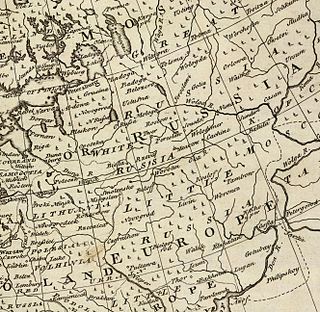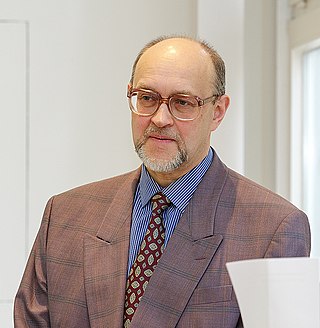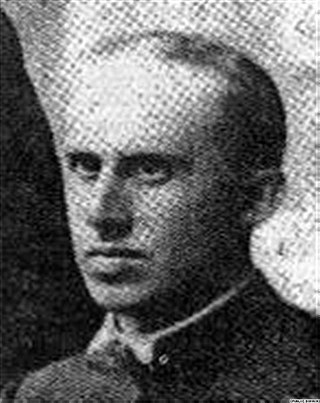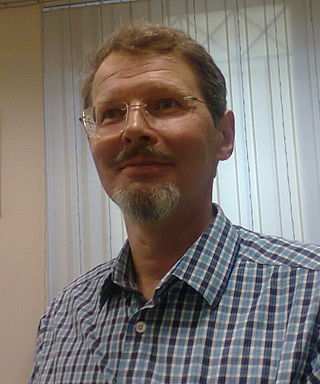Life
1990-1993, he was lecturer of the department of Ancient and Medieval History of Taras Shevchenko University of Kiev. In 1993 he defended his Ph.D. thesis on the topic of "Political and historical concepts of Medieval Japan XIII – first half of XIV century". 1993-1994 he worked as a diplomat in the Department of Countries of Asia and the Pacific Rim in the Ministry for Foreign Affairs of Ukraine.
In 1994 he came back to teaching at the faculty of history of Taras Shevchenko National University of Kiev. Since 1995 – associate professor, since 2000 – professor of the department of Ancient and Medieval History. In 1999 he defended the thesis on the topic “Origin of the military samurai State system in Traditional Japan (middle I millennium B.C. – XIV cent. A.D.)”, which became the first doctoral thesis in the field of the study of Japan in Ukrainian historical science. He has published about 90 scientific and educational works on History, Philology, Literature and Politology in the field of Orientalism and pre-Columbian Americanology. Author of scientific publications on Japanese, Korean, Chinese, Arabic, Islamic, African and Indianistic studies.
He published the first textbook in Ukraine on the history of the History of Medieval East (2002) and the first textbook in Ukraine on the history of civilizations of pre-Columbian America (2005), in which he explained the mechanism of the support of social stability social systems of Ancient Indians through the system of strict compliance of status and material welfare given to every individual with the directly proportional quantity of demonstrative sacrificial obligations. He published two summarizing monographs on the modern history of Asia and Africa (2007, 2010), in which he developed and implemented in the scientific circle the concept of post-Middle Ages as a specific and integral epoch in the history of civilizations of Classic East. On the basis of personal studies of many years he developed and implemented in the scientific circle a new system of transcription of Japanese words by means of Ukrainian language. On the basis of personal author’s system of transcription of Japanese words by means of Ukrainian language developed for the first time Ukrainian theme reader for university course “The History of Medieval East” (2011).

Little Russia, also known in English as Malorussia, Little Rus' and Rus' Minor, is a geographical and historical term used to describe Ukraine. The first use of such names has been attributed to Yuri II Boleslav, the ruler of the Ruthenian Kingdom of Galicia–Volhynia. In 1335, he signed his decrees Dux totius Russiæ minoris. The distinction between "Great" and "Little" Rus' probably originated among Byzantine, Greek-speaking, clerics who wanted to separate the two Ruthenian ecclesiastical metropolises of Halych and Moscow.

Kyi, Shchek and Khoryv were three legendary brothers—often mentioned along with their sister Lybid —who, according to the Primary Chronicle, founded the medieval city of Kyiv, which eventually became the capital of Kievan Rus' and present-day Ukraine. There is no precise and historically established information about the rule of Kyi and the establishment of the city of Kyiv.

The Directorate, or Directory was a provisional collegiate revolutionary state committee of the Ukrainian People's Republic, initially formed on 13–14 November 1918 during a session of the Ukrainian National Union in rebellion against the Ukrainian State. During the Anti-Hetman Uprising it was named as the Executive Council of the State Affairs. Its authority was extended by the Labor Congress of Ukraine on 23–28 January 1919.
The history of Kyiv, officially begins with its founding year as 482, but the city may date back at least 2,000 years. Archaeology dates the site of the oldest known settlement in the area to 25,000 years BC. Kyiv was the historical capital of medieval Kievan Rus' from 879 to 1240, and is now the largest city and the capital of Ukraine.
The Ukrainian orthography is orthography for the Ukrainian language, a system of generally accepted rules that determine the ways of transmitting speech in writing.

Oleksander Barvinsky was an important western Ukrainian cultural figure and politician, a founder of the Christian Social Party in western Ukraine. He also was a member of the Austrian parliament, chaired the Shevchenko Scientific Society and held the post of secretary of education and religious affairs of the West Ukrainian National Republic. It was during his chairmanship that the Shevchenko Scientific Society was turned into a well established academy of sciences.

Leo Andreyevich Sheljuzhko was a Ukrainian-German entomologist who specialized in Lepidoptera, Rhopalocera. He wrote numerous scientific papers and books on the butterflies and moths of Central Asia, Ukraine, Far East, Caucasus in Russian, Ukrainian, German, and English, and described many new taxa.

Volodymyr Stefanovych Biletskyy is a Ukrainian mining engineer, D.Sc. scientist and researcher in the field of coal mining, publisher and political scientist. He has published many technical articles on the subject of mining, and was the initiator and editor of the first Ukrainian Mining Encyclopedia.

Halyna Lozko is Ukrainian ethnologist, theologian and neopagan leader. In 1993 she founded the group Pravoslavia in Kyiv, which adheres to Slavic Native Faith in the tradition established by Volodymyr Shaian. Lozko also co-founded the Native Faith Association of Ukraine, founded in 1998 and registered on 24 May 2001.

Volodymyr Potulnytskyi is a Ukrainian historian who specializes in European medieval history, Ukrainian political science, intellectual history, historiosophy and historiography of Eastern Europe.

Volodymyrska Street is a street in the center of Kyiv, the capital of Ukraine, which is named after the prince of Kievan Rus' Vladimir the Great and which is one of the oldest streets in the city, and arguably among the oldest constantly inhabited residential street in Europe. There are many educational, culture and government institutions on this street, as well as historical monuments. Four buildings from Volodymyrska Street are depicted on reverses of Ukrainian hryvnia banknotes.

The Kobyzewicz family was a boyar family of the Grand Duchy of Lithuania in the 16th—17th centuries. The family's cadet branch, Kobyzewicz-Krynicki, received the status of the Polish szlachta. The family was known for their active role in the history of Kyiv. The Kobyzewicz family is claimed to be paternal to the Lizohub family of the Cossack Hetmanate.
Yaryzhka or Orthography of Slobozhanshchyna is the name of the Russian pre-revolutionary orthography used to write and print works in the Ukrainian language in the Russian Empire. Yaryzhka included all the letters that were part of the Russian Cyrillic alphabet of the pre-revolutionary period: ы, ъ, and so on.
Valeriy Feliksovych Ivanov is a Ukrainian journalist, specialist in mass communications, Doctor of Philology, and professor. The President of the Academy of the Ukrainian Press since April 2001. . The author of the first Ukrainian textbook in "The Ethics of Journalism". The member of the National Union of Journalists and the Journalistic Ethics Commission. Head of Advertising and Public Relations Department of the Institute of Journalism at the Taras Shevchenko National University of Kyiv.
Arts of Ukraine is a collection of all works of art created during the entire history of Ukraine's development.
The History of Ukrainian literature includes laws of the historical and literary process, literary genres, trends, works of individual writers, features of their style, and the importance of artistic heritage in the development of Ukrainian literature.

Zhelekhivka was Ukrainian phonetic orthography in Western Ukraine from 1886 to 1922, created by Yevhen Zhelekhivskyi on the basis of the Civil Script and phonetic spelling common in the Ukrainian language at that time for his own "Little Russian-German Dictionary", which was published in full in 1886.

Andriy Mikhailovich Bandera was a chaplain, politician and member of the Ukrainian National Rada of the Western Ukrainian People's Republic, veteran of the Polish-Ukrainian war, member of the Shevchenko Scientific Society, a priest of the Ukrainian Greek Catholic Church, and father of Stepan Bandera.

Oleksiy Petrovych Tolochko is a Ukrainian historian and medievalist, doctor of historical studies, and corresponding member of the National Academy of Sciences of Ukraine. Tolochko is the director of the Centre of Kievan Rus' Studies in Kyiv, and is known for his work on textual criticism of the Primary Chronicle.














